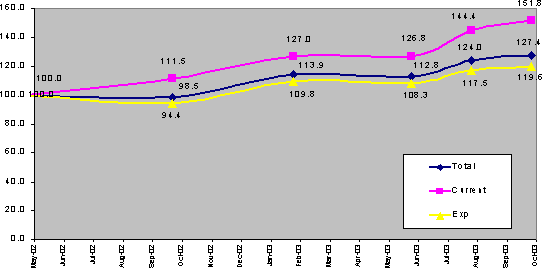The index showed a strong improvement in February this year, when it rose to 113.9. It held this level until mid-year. In August, it rose strongly again to 124.0, with a more modest but still statistically significant increase to 127.4 in October 2003.
The index has two components: a view about how economic conditions are now, and a view about how they will be in six months' time. The future expectations component is the more important and has a greater weight in the overall index. The index is calculated via a survey every second month of 2 000 metropolitan adults aged 18 years and over, sampled from the major metropolitan areas of South Africa.
- Sentiment about future economic conditions, which showed a strong increase in February 2003 to 109.8, showed a good improvement again in August to 117.5 and a small increase in the latest October data to 119.6. This suggests a fairly bullish outlook for 2004 from people in general, with the likelihood that people will make more use of credit and be more willing to take out loans and bonds. This accords well with expectations given the falling interest rates and the probability of another cut before year's end.
- Sentiment about current economic conditions has been rising faster throughout the same period and now stands at 151.8. This suggests that we can expect a bumper Christmas season from a retail point of view.
Clearly, people are expecting more positive than negative benefits to flow from the falling inflation rates, the strength of the rand, and falling interest rates. However, should the strength of the rand lead to substantial job cuts, this view may well change. Given that the effects of rand strength and falling interest rates will still take time to filter though to the whole economy, this aspect still needs to be watched carefully.
The MSI is high for all metropolitan population groups. However, different groups have risen at different rates. After a rather pessimistic reading for whites at the end of last year, there was a considerable increase in February, especially in terms of future expectations. Moderate rises have continued since then, with the current component of the index rising considerably in October. Blacks were more optimistic at the end of last year and the early parts of this year, but showed a mid-year slump. Their August rise leveled off in October, with some concern in terms of current conditions. After some initial pessimism, the Indian community showed a very strong end of year rise. The coloured community has showed moderate optimism.
This suggests that the major retail impact over the Christmas period will be from the more upper income sectors.

The main contributors to the positive change this year have been better expectations around the ease of finding jobs, and clear expectations that inflation would improve. This has led to people feeling more optimistic about both business conditions in the next six months, and their own personal economic circumstances in the next six months.
Further, the most recent major improvements in sentiment have been helped along by actual present business conditions being perceived to be really better. Clearly, expectations for a good Christmas season abound.
Background to the MSI
"Sentiment" is said by many to be one of the key drivers in many markets - financial, consumer, durables, the stock market and so on. Research Surveys, South Africa's leading consumer marketing research and information supplier, has developed a new Market Sentiment Index (MSI) ideally suited to SA conditions (as a developing country) to provide decision-makers in all parts of the economy with some idea of people's sentiment towards the economy and, hence, their future well-being.
This index examines people's current and future perceptions of the economy in terms of job availability, business conditions, general economic conditions, prices and inflation, likely income, and the effects of AIDS and crime on the economy. These two constructs - "where are we now?" and "where are we going?" are then combined into an overall index. The future perceptions measure, in particular, can be a leading indicator of changes in people's spending patterns if it changes over time by any material amount.
The index was first measured in May/June 2002. The MSI is tracked regularly, using the first study in May/June 2002 as the benchmark to report future changes. The study is conducted on a sample of 2 000 adults (male and female) in South Africa's main metropolitan areas, and is representative of all population groups in those areas.